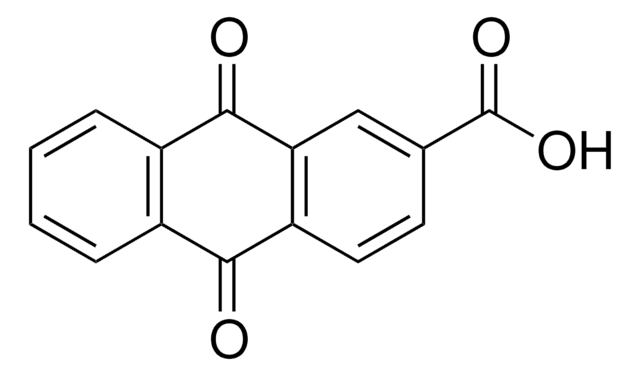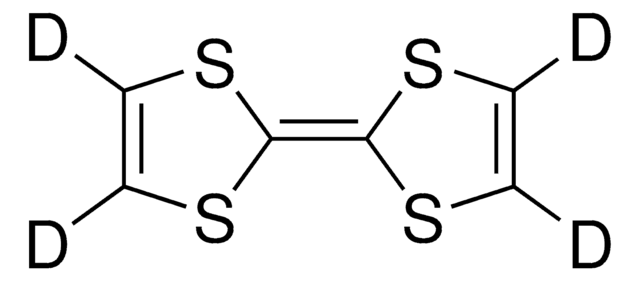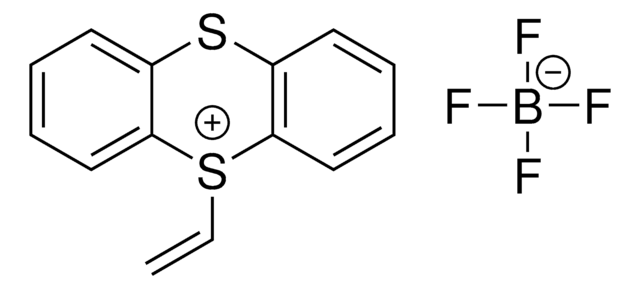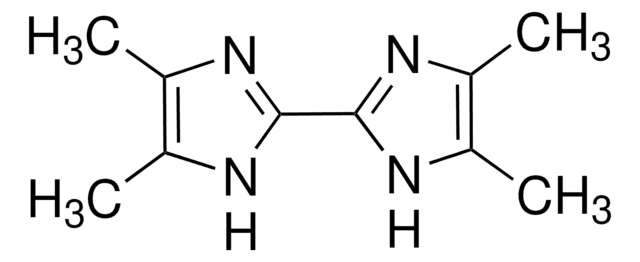695637
Dibenzotetrathiafulvalene
97%
Synonyme(s) :
DB-TTF, [2,2’]Bi[benzo[1,3]dithiolylidene]
Se connecterpour consulter vos tarifs contractuels et ceux de votre entreprise/organisme
About This Item
Formule empirique (notation de Hill):
C14H8S4
Numéro CAS:
Poids moléculaire :
304.47
Numéro MDL:
Code UNSPSC :
12352103
ID de substance PubChem :
Nomenclature NACRES :
NA.23
Produits recommandés
Niveau de qualité
Pureté
97%
Forme
solid
Pf
239-243 °C
Chaîne SMILES
S1C(\Sc2ccccc12)=C3/Sc4ccccc4S3
InChI
1S/C14H8S4/c1-2-6-10-9(5-1)15-13(16-10)14-17-11-7-3-4-8-12(11)18-14/h1-8H
Clé InChI
OVIRUXIWCFZJQC-UHFFFAOYSA-N
Description générale
Dibenzotetrathiafulvalene (DBTTF) is an organic semiconductor that is completely conjugated with a symmetric structure. It forms stacks of planar molecules with a distance of 3.948 Å. DBTTF has a high mobility of charges and can be prepared from anthranilic acid and purified by sublimating in vacuum.
Application
DB-TTF is used to make semiconducting charge transfer salts with electron accepting (n-type) materials, for example TCNQ (Aldrich Prod. No. 157635) and F4TCNQ (Aldrich Prod. No. 376779 ).
DBTTF is an organoelectronic material that forms a charge transferring complex with a variety of semiconducting crystals which include 7,7,8,8-tetracyanoquinodimethane (TCNQ) and 2,3-dichloro-5,6-dicyanobenzoquinone (DDQ). These materials can be in the form of single crystals and thin films for the fabrication of organic field effect transistors (OFETs) and organic light emitting diodes (OLED).
Mention d'avertissement
Warning
Mentions de danger
Conseils de prudence
Classification des risques
Aquatic Acute 1 - Aquatic Chronic 1
Code de la classe de stockage
11 - Combustible Solids
Classe de danger pour l'eau (WGK)
WGK 3
Point d'éclair (°F)
Not applicable
Point d'éclair (°C)
Not applicable
Équipement de protection individuelle
Eyeshields, Gloves
Faites votre choix parmi les versions les plus récentes :
Déjà en possession de ce produit ?
Retrouvez la documentation relative aux produits que vous avez récemment achetés dans la Bibliothèque de documents.
Les clients ont également consulté
Single-crystal organic field-effect transistors based on dibenzo-tetrathiafulvalene
Mas-Torrent M, et al.
Applied Physics Letters, 86(1), 012110-012110 (2005)
Control of film morphology and its effects on subthreshold characteristics in dibenzotetrathiafulvalene organic thin-film transistors
Yamada T, et al.
Applied Physics Letters, 92(23), 210-210 (2008)
Emge, T.J.; Bryden, W.A.; Wiygul, F.M.; Cowan, W.O.; Kistenmacher, T.J.
J. Chem. Phys. , 77, 3188-3188 (1982)
Polymorphism in the 1: 1 Charge-Transfer Complex DBTTF-TCNQ and Its Effects on Optical and Electronic Properties
Goetz KP, et al.
Advanced Electronic Materials, 2(10), 1600203-1600203 (2016)
María Elena Sánchez-Vergara et al.
Polymers, 12(1) (2019-12-22)
Chemical degradation is a major disadvantage in the development of organic semiconductors. This work proposes the manufacture and characterization of organic semiconductor membranes in order to prevent semiconductor properties decreasing. Semiconductor membranes consisting of Nylon-11 and particles of π-conjugated molecular
Notre équipe de scientifiques dispose d'une expérience dans tous les secteurs de la recherche, notamment en sciences de la vie, science des matériaux, synthèse chimique, chromatographie, analyse et dans de nombreux autres domaines..
Contacter notre Service technique





![4-Sulfocalix[4]arene ≥97.0% (HPLC)](/deepweb/assets/sigmaaldrich/product/structures/850/271/811854c6-ae9d-4f7a-b9e8-c34a7de4e4c6/640/811854c6-ae9d-4f7a-b9e8-c34a7de4e4c6.png)






